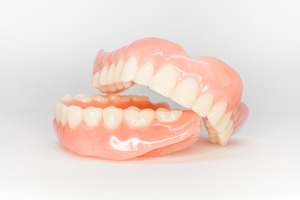
Well-fitting dentures can absolutely change your life for the better. The number of foods you’ll be able to eat will expand dramatically, and you’ll be able to talk to people with much greater confidence than ever before.
However, poorly fitting dentures can be more of a liability than an asset. Not only are they inconvenient, recent research also suggests that they can even be a major health risk. Here’s what you should know about how loose dentures could affect your quality of life, potentially lead to serious health problems, and how to tell if your dentures are due for a reline.
Loose Dentures and Cancer Risk
Oral cancer is unfortunately rather common and is therefore naturally a subject of intense study by researchers. Of particular interest is some data suggesting that poorly fitting dentures irritate the gums in such a way that patients will have a higher risk of oral cancer, especially in conjunction with poor dental hygiene.
One metanalysis of several studies published in the Journal of Oral Oncology in 2014 found that a preponderance of the data suggests that dentures (especially ill-fitting dentures) lead to an increased risk of oral cancer.
Signs of Loose Dentures
This being the case, it’s a good idea to be vigilant for signs that your dentures don’t fit as well as they should. Here are a few things to look for:
- Looseness or Slippage: If your dentures feel loose and slip around in your mouth, it’s a clear indication that they don’t fit well. This can make eating and speaking challenging.
- Swollen or Red Gums: Sore, swollen, or red areas of your gums underneath the denture can be a sign of poor fit. If you notice any discomfort in your gum tissue, it’s essential to address it promptly.
- Discomfort While Eating: Dentures that don’t fit correctly can cause discomfort while chewing. If you find it challenging to eat certain foods or experience pain during meals, it’s time to consult your dentist.
- Visible Breakage or Warping: Incorrect care and maintenance can cause dentures to warp or change shape. If your dentures have altered in shape or broken during normal use, it’s a sign that they need attention.
Should you notice any of these symptoms, you should talk to your dentist. They’ll be able to reline your dentures, allowing them to fit snugly to your gums without any issue.
About the Author
Dr. Herbert T. Hudson believes that, like your prosthetics, your dental treatment should be designed to fit you perfectly. That’s why he feels enormously proud to have formed strong relationships with his patients over the years and that he has been able to ensure that all of their dental needs are met. Dr. Hudson received his dental degree from Louisville School of Dental Medicine, and has since studied with the prestigious Dawson Academy, Las Vegas Institute, and with SPEAR Education.
If you have any questions about your dentures, he can be reached at his website or by phone at (910) 295-2750.

